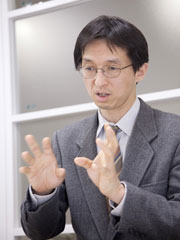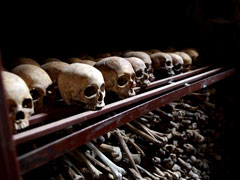Interview【JICA-RI Focus Vol.4】Interview with Senior Research Fellow Shinichi Takeuchi
2009.04.20

Bloodshed continues Africa -- in Sudan’s Darfur, in Somalia and in eastern Uganda.
JICA-RI’s Senior Research Fellow Dr. Shinichi Takeuchi has been studying conflict prevention and peace building in Africa since the late 1990s, with attention centered particularly on Rwanda. We asked him why conflicts are occurring in Africa, how the international community can prevent them and what role JICA-RI can play.
What prompted you to study armed conflict?
While doing agricultural research in the early 1990s, I got caught up in a civil war in Brazzaville, Republic of the Congo. I fled that country and decided to resume my research in Gabon, next door to Congo. In April 1994, the day before I moved to Gabon, the president of Rwanda was assassinated, and the Rwanda genocide followed.
News on Rwanda was everywhere during my stay in Gabon. In Japan there was extensive media coverage of the possible dispatch of Japanese Self Defense Force troops to eastern Zaire (now Democratic Republic of the Congo) to help with the influx of refugees from Rwanda. But in this coverage the conflict in Rwanda, which was the cause of the refugee emergency, was often oversimplified as a "tribal clash between Hutus and Tutsis," implying that all African conflicts were tribal clashes.
I was uncomfortable with such a misleading generalization by the media since I had witnessed firsthand in the case of the Congolese conflict how politicians manipulated the people with a stereotypical use of tribalism. Thus, after returning to Japan, starting around 1997, I decided to commit to the study of conflict in Africa.
What precipitated recent conflicts in Africa?
The number of conflicts in Africa increased from around 1960, when many countries became independent, and climaxed in the early 1990s. Most of them were civil wars, such as in Rwanda and also in Sierra Leone, which was featured in the film Blood Diamond, Other conflict countries in the 1990s included Liberia, Burundi, Democratic Republic of the Congo (former Zaire) and Republic of the Congo (which I fled).
Why did the number of conflicts increase in Africa in the 1990s?
Many countries in Africa that became independent during the 1960s generated authoritarian regimes. Those regimes remained protected and supported under the logic of geopolitics during the Cold War. Both the western and eastern blocs wished to bring the newly independent African countries into their camp without necessarily reforming the internal politics of those countries. That framework crumbled starting in the 1980s with worsening economies and political liberation prompted by the end of the Cold War. The failure of governance systems in Africa became the backdrop of the conflict breakouts in the 1990s.
Thus, the African conflicts of the 1990s were basically civil wars fought about state governance. Emphasizing ethnicities with such expressions as "tribal clash" is misleading. African conflicts are not about tribes but about governance.
How much do religions weigh in these conflicts?
Religion rarely becomes a key conflict issue between groups in Africa. Religion-related conflicts do occur in such regions as Sudan and Nigeria. But in these instances religion is integrated into ethnic (tribal) issues.
I would point out also that religious differences are used in political fighting just as ethnic differences are. Politicians in the same constituency label the opposition as "infidels" and incite persecution of them.
Would you say that the African conflicts have been bred largely by the colonial past?
Yes, I would. The European countries drew national borders in Africa for their own convenience at the end of the 19th century, creating nations and borders with no relevance to the social units existing in the area. Those who gained power often exacerbated confrontations among people, using ethnic and religious identities to expand their base. This made it difficult to reach consensus on how to build political order within the prescribed territories, creating a situation conducive to the outbreak of violent confrontations.
How has the international community responded to the African conflicts?
Once the Cold War was over, and confrontation between the U.S. and the Soviet Union within the Security Council ended, the international community led by the United Nations (UN) was finally ready for conflict intervention and peace building. At the beginning of the 1990s, this activity grew aggressively.
However, the UN learned some painful lessons during the 1990s. The peacekeepers who were sent to Somalia on a humanitarian mission clashed with local forces and suffered many casualties. A further blow to the UN and the U.S. was the October 1993-incident depicted in the film Black Hawk Down, in which U.S. soldiers were murdered and dragged through the streets.
The genocide in Rwanda took place only six months after that incident. With the memory of Somalia still vivid, the Security Council was hesitant about intervening in Rwanda so the peacekeeping operation there was deployed without license for military intervention. As a result, the UN peacekeepers withdrew as massacres were still continuing. As seen in the movie Hotel Rwanda, this case marked a significant failure by the international community.

Genocide Memorial Site in Rwanda
Photo: Atsushi Shibuya/JICA
Later that same year, the international community severely criticized itself for ignoring the genocide, the most serious of crimes against humanity. UN Secretary-General Kofi Annan and U.S. President Bill Clinton visited Rwanda to apologize for the shortcomings of the international community’s response.
Was there any change in the international community’s involvement with Africa after that?
Having absorbed the lessons, the rather obvious position that calls for thorough mandates, sufficient forces and equipment in peacekeeping operations now prevails. The international community’s commitment to ending conflicts in Africa and the scale of its operations has grown.
Not only military intervention but also development assistance efforts have increased since the 1990s. The international community has expanded a commitment to rebuilding post-conflict states to include building fragile states from scratch.
Conflicts are still continuing in such regions as Darfur, Sudan and Somalia. But the overall number of conflicts in Africa is declining, probably as a result of expanded intervention by the international community.
However, peace-building prospects for Africa are not all bright. Many countries are situated in the vague realm "between war and peace."
What do you mean by the vague realm between war and peace?
Even though a conflict may have ended, democratic governance and freedom of expression may not have been established. Conflict prevention through economic development may also be doubtful if commodity export is the only source of foreign currency or if corruption is rampant. Weapons may not be satisfactorily decommissioned, or unemployment or bleak prospects may drive demobilized soldiers to robbery. Due to these sorts of problems, peace building remains a challenge in many countries.
In such situations, rather than intervening in the political arena would development aid be the international community’s best contribution?
Politically neutral economic aid is impossible in post-conflict nations. Development aid always involves political aspects; in what region to build a road, for example, is a very political issue.
Rather, donors should be aware of their political impact and choose the best method of involvement accordingly. Grasping the local situation and the political structure, understanding who to deal with, and devising the means of reconstruction assistance that would be of greatest benefit; all are important.
Are the solutions still not found for ongoing conflicts?
That is right. Sudan’s Darfur, Somalia and the eastern part of the Democratic Republic of Congo, they all have reasons for letting their wars drag on and for neglecting state-building issues. Local forces have difficulty resolving the problems on their own and the international community is unable to provide sufficient military capacity to calm the situation.
Japan has passed a resolution to dispatch the SDF to counter pirates in the sea off Somalia but the root of the problem will not go away without fundamental improvement. Those people are in part pirating for survival.
What kind of roles can JICA-RI play?
Third-party country engagement in post-conflict peace building and social reconstruction basically started after the Cold War and experience is still limited. There are no clear rules within the international aid framework, leaving everyone to grope in the dark.
The strength of JICA-RI is in its experienced professionals who have been involved with on-site development assistance. I have been committed to fundamental research but would like to communicate with those professionals, to link their hands-on experience with my studies.
What kind of research are you conducting in Rwanda now?
For the past 10 years I have been interviewing about 50 families in southern and eastern Rwandan villages to understand what is on their minds. Each year I have a different theme. These two regions have geographic and climatic differences and are also distinct in lifestyle and postwar experience; specifically, the eastern region has many refugees returned from Tanzania and Uganda compared to the southern region.
I’ve asked them about their experiences during the civil war as well as measuring the agricultural land they own. In recent research, I asked their opinions about the genocide trial called Gacaca while collecting the trial materials. I have teamed with the same Rwandan researcher for the past 10 years and we have discerned many things behind the answers, such as the village roots, power structures and persecutions.
In addition to such detailed surveys, I would like eventually to change my research approach by expanding to a wider variety of regions and countries. JICA offices are located worldwide; I would like to exploit that organizational strength in future studies.

事業事前評価表(地球規模課題対応国際科学技術協力(SATREPS)).国際協力機構 地球環境部 . 防災第一チーム. 1.案件名.国 名: フィリピン共和国.

事業事前評価表(地球規模課題対応国際科学技術協力(SATREPS)).国際協力機構 地球環境部 . 防災第一チーム. 1.案件名.国 名: フィリピン共和国.

事業事前評価表(地球規模課題対応国際科学技術協力(SATREPS)).国際協力機構 地球環境部 . 防災第一チーム. 1.案件名.国 名: フィリピン共和国.

事業事前評価表(地球規模課題対応国際科学技術協力(SATREPS)).国際協力機構 地球環境部 . 防災第一チーム. 1.案件名.国 名: フィリピン共和国.

事業事前評価表(地球規模課題対応国際科学技術協力(SATREPS)).国際協力機構 地球環境部 . 防災第一チーム. 1.案件名.国 名: フィリピン共和国.
scroll